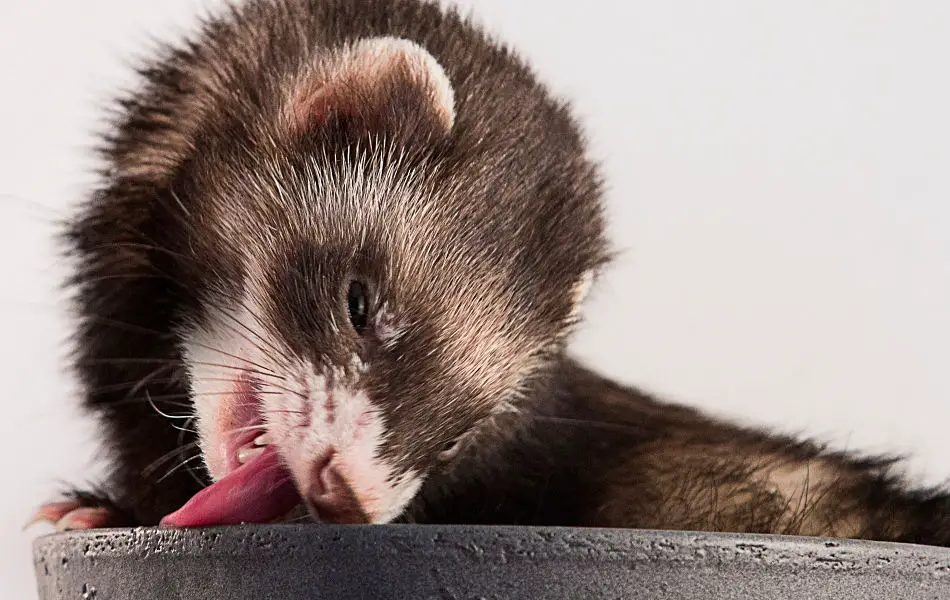
One of the great health risks for your furry pal is gastrointestinal blockage or obstruction, caused by swallowing something he/she shouldn’t. That can be your pet’s own hair or some foreign object. Both can make huge problems which may end fatally.
If you want to know more about the reasons why it happens how to recognise the symtoms and what to do please read this article.
Table of Contents
Hairballs
Why it is happening ?
Ferrets like to groom themselves and during this process they can easily ingest their own hairs. When ingested hairs reach stomach or intestines they may set up there and start to form hairball.
Especially risky periods are spring and fall- shedding season for ferrets. If you have a cat then you might ask yourself why this is a problem, cats do the same and they do not have any health issues because of that. Well, unlike cats, ferrets cannot get rid of the hairballs through vomiting, that is why this condition in ferrets is rather serious and needs to be treated.
Signs of hairballs
Hairball can cause vomiting and lack of appetite. You may also find some hairs in your pet’s poop.And when it comes to the poop, it can be thin in case of hairballs.
The thing is that not all ferrets with hairballs will have those symptoms, some of them will show no signs at all. If signs do appear, do not ignore them and what also important, do not try to treat your furry ball by yourself, ask vet for advice.
Vet’s care in case of hairballs – diagnose and treatments
Your vet might be able to diagnose this problem based on your words and if not, he/she will perform physical examination. The vet might be able to feel the hairball if not so small and if yes, X-rays could help.
Regarding treatment, your vet will advise what is the best solution for your pet, but in general there are two different way to solve issue with hairballs.
First one is laxative which you will be advised to give your ferret together with food or to administer it directly to its mouth. Laxative should help your furry pal to eject hairball. In case your vet considers laxative can move hairball from stomach to intestine but not further which would allow hairball to stay there,then surgery would be the only way to sort this out. Hairballs lodged in intestine are far more dangerous then those in stomach.
Recovery may take a while, depends on how the hairballs had been treated. If your pet had surgery then your vet will tell you what changes you need to make in ferret’s diet until he /she is recovered completely. More often visit to the vet is also part of recovery period.
How to prevent hairballs?
- Use a soft brush to comb your furry ball on a regular basis, especially during the shedding season.
- In case you have attachment for vacuum cleaner designed for this purpose, even better.
- During shedding season you can give your pet a small amount of pumpkin or coconut oil, a couple of times per week to remove any hairs from your pet’s gut.
- Instead of natural oils, you can give your pet malt-based laxative on daily basis ( usually an inch of laxative paste but it is always better to consult the vet on this moreover its usage can affect the lungs)
Other gastrointestinal blockages – foreign objects in ferrets stomach
What else can go wrong with your pet’s gastrointestinal tract beside hairballs? Fortunately ferrets are predictable when it comes to their habits and favourite play.
We all know that ferrets like to dig and chew on things. While they do that, they can accidentally swallow some small parts which can cause a huge problem. This is more likely to happen in younger ferrets under 1 year old but can happen in older as well.
The most common things they like to chew on and swallow are sponges and rubber pieces. That is one the reasons why you never should let your furry ball unsupervised while she/he is playing out of the cage. They simply adore:
- Buttons from the remote or keyboard or shirts
- Balloons
- Pens ( especially if they have rubber grip )
- Soft and plastic toys
- Rubber
- Styrofoam
- Piece of cork
- Pits from olives or other small fruit ( cherry, apricot, plum, data, peach …)
- Bottle caps
Signs of foreign objects in ferrets stomach
The most common signs are lack of appetite that can lead to anorexia and lethargy. Signs that also can occur are vomiting, excessive salivation, abdominal pain.
Lethargy and lack of appetite – as a sign of foreign object in ferrets stomach
your pet is not in the mood for playing games. Ok, that can happen but if he/she is lethargic, does not have energy and along with that does not want to eat or eat very little, you should be worried. It is advisable to weigh your furry ball on a regular basis so you always know what is his/her real weight.
The normal weight of female ferrets is about 1-2 pounds and for males 2-5 pounds. Any weight loss( beside small weight changes in spring and fall) is an alert sign
In case your furry ball swallows something that should not be swallowed, he or she might try to solve the problem by vomiting.
If he /she does not succeed, the foreign object will continue its way towards the stomach where it will cause irritation. Vomiting usually provoke dehydration,so be careful if your furry pal keeps throwing up and provide a lot of water for him/her.
Not every blockage will cause vomiting, so do not wait for this sign to show up in order to seek for vet’s help.
Excessive salivation – as a sign of foreign object in ferrets stomach
This can also be a sign. excessive salivation occurs as a response of organisms on foreign objects.In this case a large amount of saliva acts as a lubricant, trying to eject swallowed thing.
If foreign object has sharp edges ( broken bone for example) it might hurt your pet’s throat or stomach or intestines. In that case blood can show up in ferret’s poop, which will make it very dark or even black. Even if there is no blood in feces, if it is too small, skinny( smaller then regular ), that could also be the sign that something is wrong.
Other signs involve teeth grinding, lack of bowel movement, diarrhea.
Gastrointestinal blockage treatments – as a sign of foreign object in ferrets stomach
If you noticed any of the listed signs do contact vet as soon as possible, as any foreign object in your pet’s stomach or even worse intestine can cause big damage, same as hairballs.
If you hope that the problem will go away on its own, you are wrong. That kind of decision may seriously harm your pet or even kill him/her.
